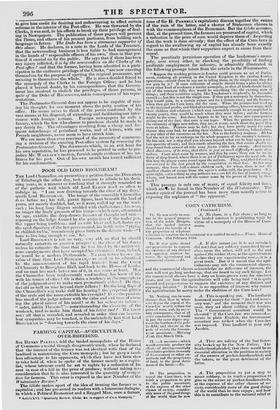FARMING CAPITAL—AGRICULTURAL OVER-BREEDING.
SIR IIENRY PARNELL told the landed monopolists of the House of Commons a useful though disagreeable truth, when he declared that the interest of the farmer was not identical with that of the landlord in maintaining the Corn monopoly ; but he gave a need- less advantage to his opponents, wlech they have not been slow to take hold of, when he spoke of the farmer merely as a capita- list, whose interests could be set to rights by a reduction of his . rent in case of a fall in the price of produce; without taking into consideration that he is also interested in the quantity of ()erupt- Lion for farmers. This error is exposed in the new Number of the • li'eettninster Review.* The Globe makes sport of the idea of treating the farmer as a: capitalist ; and has presented its readers with a humorous dialogue, in which a Political Economist and a Ragged Man, once a farmer,
• Article XVI. " Quarterly Review, Globe, &a. in support of Com Monopoly."
(one of Sir H. PARNELL'S capitalists) discuss together the causes of the ruin of the latter, and a chorus of Statesmen chimes in with the commonplaces of the Economist. But the Globe assumes, that, at the present time, the farmers are possessed of capital, which a reduction in the price of corn would deprive them of: forgetting that the work is done already; that the effect of the Corn-laws in regard to the swallowing up of capital has already been exactly the same as that which their supporters expect to ensue from their repeal. The peculiarly pernicious operation of the landowner's mono- poly, over every other, in checking the possibility of finding profitable employment for industry, is admirably illustrated in the following passage taken from the article in the Westminster.
"Suppose the working printers in London could procure an act of Parlia- ment, confining all printing in the United Kingdom to the existing London operatives,—would there be any use in telling them, in the simple case, they did not gain by it ? If some collection of stupids should frame a plan for giving every other kind of workmen a similar monopoly, so that all kinds should hinny eat of the common folly, this would be something like the existing state of things ; and their condition might, like Touchstone's shepherd's, be damnable enough ;—but this is not the simple case. If they got a monopoly by themselves, they would gain, to a certain extent and for a certain time ; and the farmers, when they got the Corn laws, did the same. When the printers had lived up to the increased profits, and filled all existing printing-offices, however many, with their children and relations (which may reasonably enough be accomplished in twenty years), they would be much where they were before ; and the farmers might he the same. But there happen to he two or three new consequences arising out of the fact, that corn is not types. When the printers have got to the extremity of t Printers new tether, they are at worst, much about the point they were at before. rioters may he full ; but they have pretty nearly the same chance they ever had, for making their children hosiers, /ratters, hole, dashers, or any other of the vocations on the list. Not so the farming conjuror. lie has had the wit to lay an embargo on the whole progress of the country's industry. Ile has said, not a step shall you advance beyond what can be kept upon a cer- tain quantity of corn; and then stands admiring the fact, that cousin Jack's six
long-boned lads cannot all take snug farms within the county. And cousin Jack discovers, if he tries, that there is just as much difficulty to make dam
tailors. Coats must come by wearers, and they by corn ; there can be no in- finity of shop-board, where there is an act of Parliament upon the ineal tub. In this way the plague conies round upon the authors. They, and.their labourers, are screwed to the last pinch by the competition in their line. At this very moment, they have half-a-dozen children each, for whom there is not the smallest chance of escape from the squire's coffee-mill, the poor-liou,e. It is quite right,—it is a thing to sing anthems for ;—so fall the foes of honesty every- where, l,, ere, and honest men will the sooner come by the power of living by their
,
This passage is only one of many, of equal felicity and forc, which arelo be found in this Number of the Westminster. The master spirit of the journal has been more than usually active in exposing the sophisms of " the opponent."


















 Previous page
Previous page